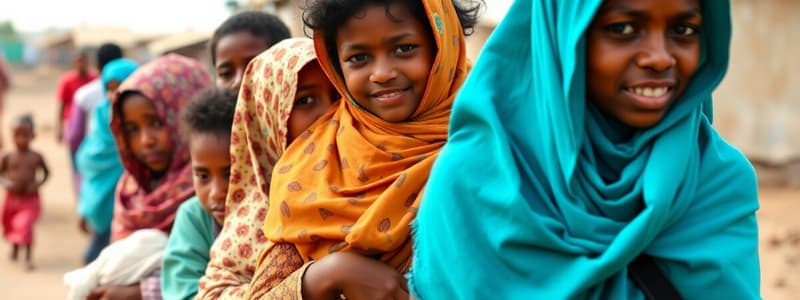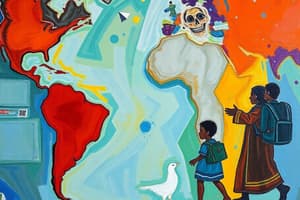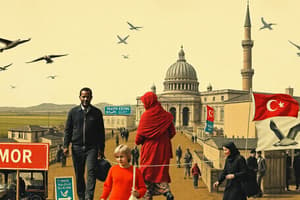Podcast
Questions and Answers
Individuals facing persecution based on their favorite hobbies are likely to migrate to secure safer living conditions.
Individuals facing persecution based on their favorite hobbies are likely to migrate to secure safer living conditions.
False (B)
The Northern Triangle's high crime rate, with most offences punished severely influenced a significant population outflow.
The Northern Triangle's high crime rate, with most offences punished severely influenced a significant population outflow.
False (B)
Economic migration typically involves movement from wealthier regions with fewer opportunities to developing regions with more opportunities.
Economic migration typically involves movement from wealthier regions with fewer opportunities to developing regions with more opportunities.
False (B)
Permanent relocation due to a temporary and mild drought that only lasts a week classifies as environmentally motivated involuntary migration.
Permanent relocation due to a temporary and mild drought that only lasts a week classifies as environmentally motivated involuntary migration.
Environmental displacement refers to the voluntary movement of people due to attractive environmental conditions.
Environmental displacement refers to the voluntary movement of people due to attractive environmental conditions.
Seeking advanced medical treatments unavailable in one's home country would not qualify as a social factor in migration.
Seeking advanced medical treatments unavailable in one's home country would not qualify as a social factor in migration.
The desire to send a child to art camp is definitely a social-related motivation for migration.
The desire to send a child to art camp is definitely a social-related motivation for migration.
A widespread marketing campaign promoting urban life, if successful, can be classified as an environmental motivator for migration.
A widespread marketing campaign promoting urban life, if successful, can be classified as an environmental motivator for migration.
Individuals seeking medical treatment unavailable in their home country represent a form of migration driven by economic hardship.
Individuals seeking medical treatment unavailable in their home country represent a form of migration driven by economic hardship.
Entering a country with a valid visa, but then remaining after the visa has expired, constitutes legal migration.
Entering a country with a valid visa, but then remaining after the visa has expired, constitutes legal migration.
Environmental factors, such as rising sea levels, primarily induce internal migration rather than international migration.
Environmental factors, such as rising sea levels, primarily induce internal migration rather than international migration.
A 'brain drain' refers to the phenomenon where a country experiences a net loss of highly skilled professionals due to emigration.
A 'brain drain' refers to the phenomenon where a country experiences a net loss of highly skilled professionals due to emigration.
Migration driven by family reunification is primarily motivated by economic factors rather than social ties.
Migration driven by family reunification is primarily motivated by economic factors rather than social ties.
An individual who crosses a border into a new country via established channels, but provides fraudulent documentation, is considered a refugee.
An individual who crosses a border into a new country via established channels, but provides fraudulent documentation, is considered a refugee.
Graduate programs in the United States are considered a significant pull factor, attracting talented individuals globally and primarily driving refugee migration.
Graduate programs in the United States are considered a significant pull factor, attracting talented individuals globally and primarily driving refugee migration.
Flashcards
Illegal Migration
Illegal Migration
Entering or remaining in a country without legal authorization.
Uninspected Entry
Uninspected Entry
Entering a country without inspection by immigration officials.
Fraudulent Entry
Fraudulent Entry
Entering a country using false documents or misrepresentation.
Economic Migration
Economic Migration
Signup and view all the flashcards
Environmental Migration
Environmental Migration
Signup and view all the flashcards
Brain Drain
Brain Drain
Signup and view all the flashcards
Internal Migration
Internal Migration
Signup and view all the flashcards
Safety Factors in Migration
Safety Factors in Migration
Signup and view all the flashcards
Social Factors in Migration
Social Factors in Migration
Signup and view all the flashcards
Displacement
Displacement
Signup and view all the flashcards
Northern Triangle
Northern Triangle
Signup and view all the flashcards
Migration due to Persecution and Discrimination
Migration due to Persecution and Discrimination
Signup and view all the flashcards
Rural to Urban Migration
Rural to Urban Migration
Signup and view all the flashcards
Study Notes
- Migrants and refugees are individuals forced to leave their homes for various reasons, seeking a better life.
Safety Factors
- Safety factors, such as persecution and discrimination based on nationality, race, religion, political beliefs, or group membership, can cause migration.
- People move to find safer living locations.
- Danger leading to migration can be formal (war) or informal (gang activity).
- In 2016, Guatemala, Honduras, and El Salvador, known as the Northern Triangle, were among the world's most violent regions.
- The Northern Triangle countries record thousands of crimes by local and international gangs and armed criminal groups.
- Most crimes in the Northern Triangle go unpunished.
- Approximately 10% of the Northern Triangle's population has already left due to extreme violence.
Economic Factors
- Economic migration, either permanent or seasonal, is a common reason to migrate.
- People migrate from poorer to richer areas for higher wages and more job opportunities.
- Rural residents migrate to urban areas for more competitive opportunities.
Environmental Factors
- Migration due to environmental factors is becoming increasingly involuntary.
- Environmental factors cause displacement, or the forced movement of people.
- Crop failure results in food scarcity, and a drop in agricultural jobs, prompting migration for better opportunities and climate.
- Pollution of water, air, and soil in urban and rural settings creates health risks, forcing people to seek a better life in other regions.
Social Factors
- Social factors motivating migration arise from the desire to achieve a better quality of life.
- Migrants seek better opportunities for themselves or their families, such as safer schools or better jobs.
- United States graduate programs are popular for talented individuals.
- People migrate for services like life-saving surgery or medical treatment unavailable in their home area.
Illegal Migration
- Illegal migration occurs when people enter or stay in a country without legal permission, also known as illegal immigration or undocumented immigration.
- Examples include entering a country without inspection, with an expired visa, fraudulently, crossing a border improperly, or staying after a visa expires.
Contemporary Migration
- In the contemporary world, the primary causes for migration include economic factors (better employment opportunities and higher wages), environmental issues (climate change, droughts, floods), political persecution, armed conflict, family reunification, and better education.
- People migrate to improve their quality of life by escaping hardship and seeking better prospects.
Key Migration Causes
- Economic factors are significant, with people moving for higher paying jobs, business opportunities, or to escape poverty.
- Environmental factors: Climate change related events like rising sea levels, droughts, and extreme weather force people to leave their homes and migrate to safer areas.
- Political factors: Persecution, human rights abuses, and armed conflict lead to large-scale forced migration as people seek asylum.
- Social factors: Family reunification is a key driver, with people moving to join family members already in another country.
Specific Migration Examples
- Labor migration: Moving to a country to work in a specific industry where there is high demand.
- Brain drain: Highly skilled professionals leaving for better opportunities abroad.
- Refugee migration: People fleeing war or persecution and seeking asylum in another country.
- Internal migration: Movement within a country, often due to economic disparities.
- Climate change migration: People displaced from homes due to extreme weather caused by climate change.
Studying That Suits You
Use AI to generate personalized quizzes and flashcards to suit your learning preferences.




